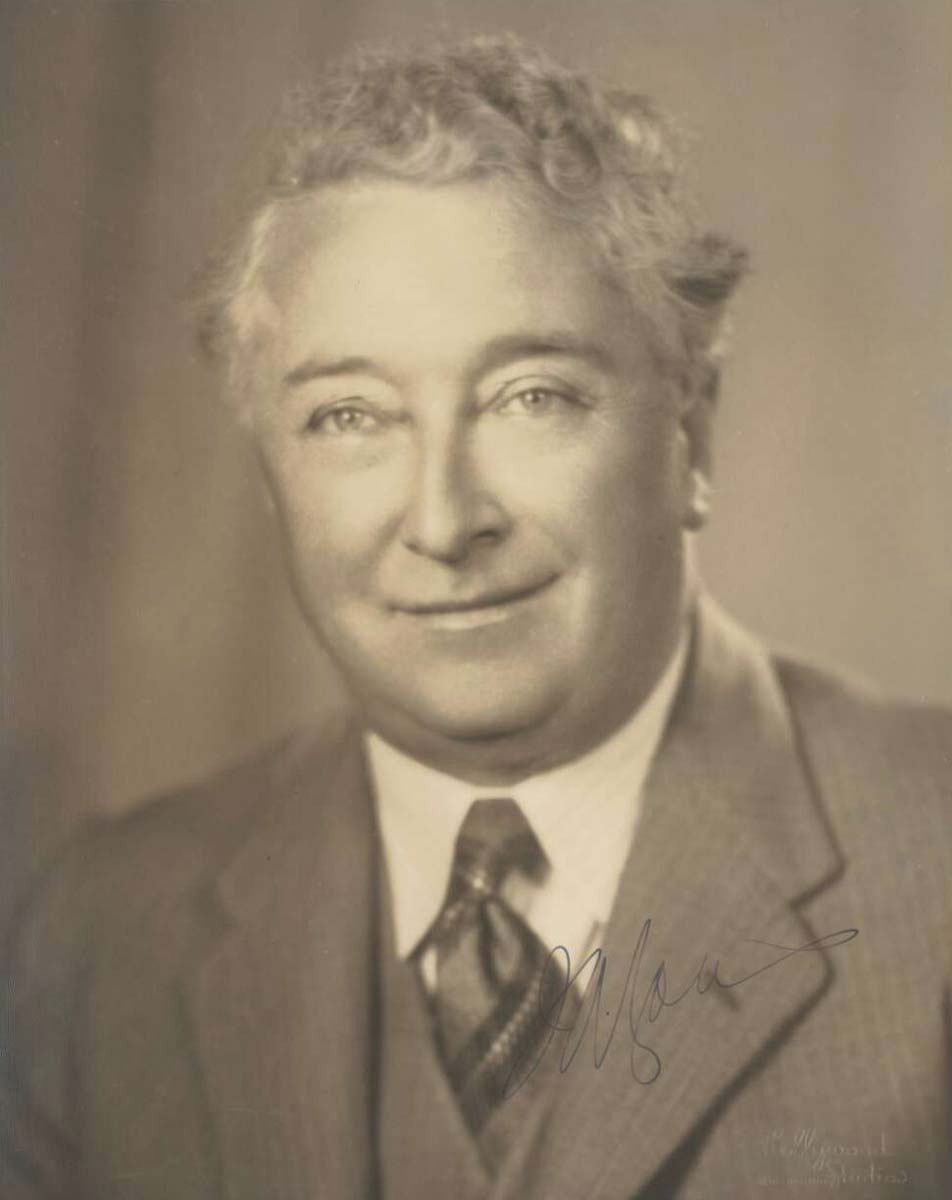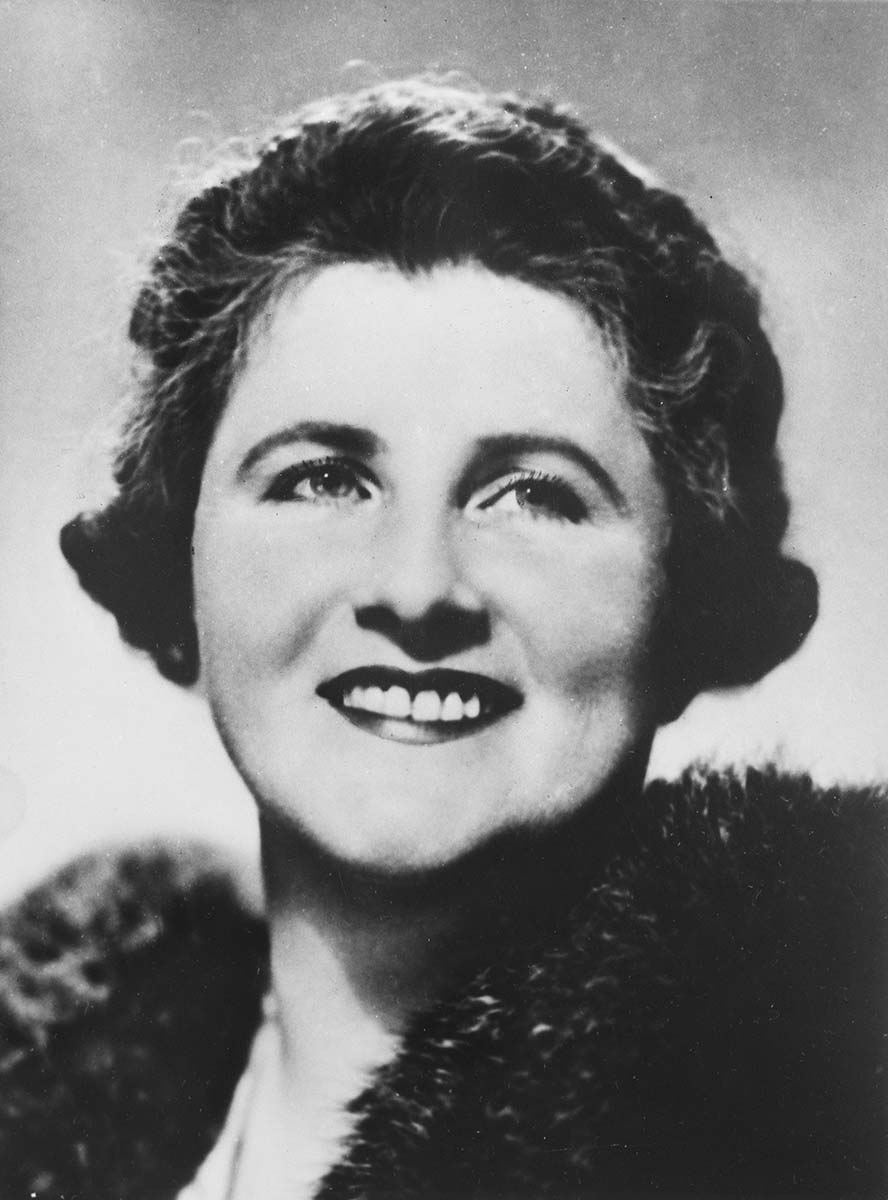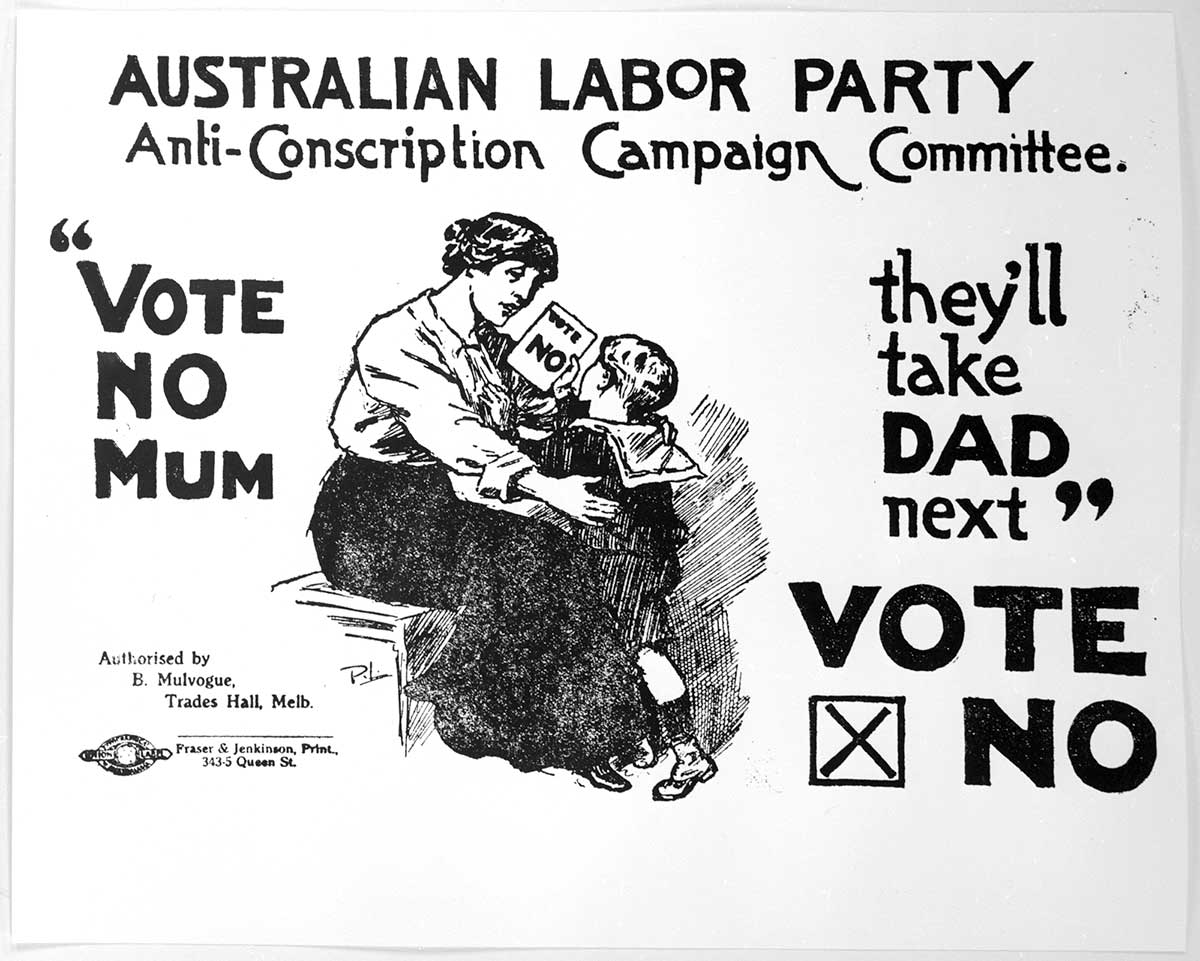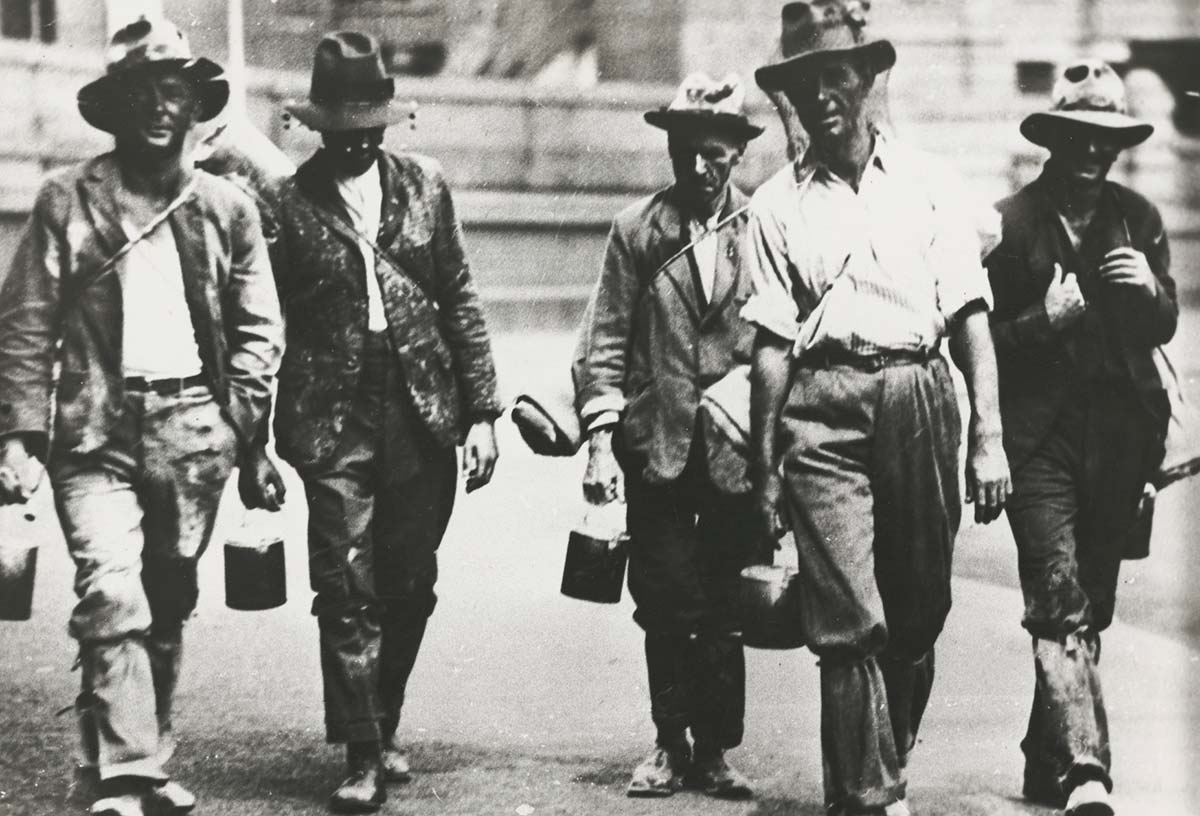Australia’s 10th Prime Minister

6 January 1932 to 7 April 1939
Joe Lyons was the Premier of Tasmania before entering federal parliament. He was one of Australia’s longest serving prime ministers and co-founded the United Australia Party, which held government from 1931 through to 1941.
Lyons died while still in office in 1939, and his wife entered federal politics herself. She was the first woman elected to the House of Representatives and the first female member of a federal ministry.
Lyons' beginnings
Joseph Aloysius Lyons was born in Stanley, Tasmania, on 15 September 1879. He was known as Joe. He was the fourth of eight children born to Michael Lyons and Ellen Carroll, both of whose parents were Irish immigrants.
Joe’s father Michael failed in a series of enterprises – as hotel keeper, farmer, butcher and baker – before losing his family’s savings on the 1887 Melbourne Cup. He suffered a nervous breakdown and was unable to support his family.
Joe attended a Catholic convent school in Ulverstone, but from the age of nine helped support his family by working variously as an errand boy, a printer’s assistant and a farm labourer. When he was 12 he moved back to Stanley to live with his mother’s sisters, Hetty and Mary Carroll, and to attend the local government school full-time.
He became a pupil-teacher in 1895, finally qualifying as a teacher in 1901. He taught in small schools in the north-west of Tasmania until 1907, when he won a studentship at Tasmania’s first teachers’ college in Hobart. After graduating he taught in Launceston and Hobart.
Lyons' progressive priorities
Joe Lyons was influenced by the Irish radicalism of his mother and aunts and, after being involved in debating while a junior teacher, he joined the Workers’ Political League, which was the forerunner of the Australian Labor Party (ALP) in Tasmania.
He was very critical of people with large landholding interests and was in frequent conflict with his employer, the Tasmanian Education Department, for his political activities.
Lyons resigned from the teaching service in 1909 to contest the seat of Wilmot in the state Legislative Assembly. He was horsewhipped during the campaign by a large landowner he had criticised.
Once elected, he promoted a series of progressive reforms, including free medical treatment and education for children, a state medical scheme, reform of the Legislative Council, aid to farmers, factory legislation and the breaking up of large estates.
Lyons' entry into state politics
In 1912 Lyons was elected president of the state ALP branch. In 1914 he became Deputy Leader of the parliamentary ALP. From April 1914 to April 1916 he served as Treasurer, Minister for Education and Minister for Railways in John Earle’s ALP government.
During this period, he reformed the Education Department, abolished school fees, improved teachers’ conditions and pay, and had Tasmania’s first high schools built in Hobart and Launceston. The Easter Uprising in Dublin in 1916 reawakened his sense of Irish nationalism; he became vice-president of the Hobart United Irish League that year.
Lyons opposed conscription and campaigned strongly for the ‘No’ vote in the conscription referenda in 1916 and 1917. When the ALP split over conscription in November 1916, Earle resigned as parliamentary party leader in Tasmania and Lyons was elected to replace him. He spent almost seven years as state opposition leader from 1916 to 1923.
Lyons stood unsuccessfully as the ALP candidate for the federal seat of Darwin (in Tasmania) at the general election on December 1919.
He became Premier of Tasmania on 25 October 1923 when the Nationalist government of Walter Lee fell after several Nationalists deserted the party. Lyons was appointed Premier at the head of a minority ALP government. As well as being Premier he took the Treasury and Railways portfolios. He remained Treasurer for the five-and-a-half years he was Premier.
Lyons’ state ALP government survived through judicious management of the state economy. His consensual approach won supporters from the Nationalists, helping the ALP retain government at the June 1925 general election.
The Nationalists eventually regrouped, however, and were returned to government by a narrow margin at the next state election in May 1928.
He married Enid Muriel Burnell in 1915. They had 12 children.
Lyons' entry into federal politics
Lyons quit state politics to enter the federal sphere at the suggestion of the federal parliamentary ALP leader, James Henry Scullin. He contested the federal seat of Wilmot for the ALP at the general election on 12 October 1929, and won comfortably. He held his seat through the next three general elections: 1931, 1934 and 1937.
Lyons' response to the economic crisis
The 1929 election brought the ALP back into government for the first time in 13 years. (Labor had remained out of office since the split over conscription in November 1916.) A week after Scullin formally took office, on 22 October 1929 the stock market crisis in New York – the Wall Street Crash – set off a complex series of corporate failures.
This resulted in the collapse of investment, mounting unemployment, falling commodity prices and a period of general worldwide economic stagnation known as the Great Depression. By 1930 the Australian unemployment rate was reaching 10 per cent, the highest level since the depression of the early 1890s.
Scullin gave Lyons the portfolios of Postmaster-General, and Works and Railways. Lyons held both ministries for the next 15 months, until he resigned from Cabinet on 26 January 1931. While Scullin was overseas from August 1930 to January 1931, Lyons served as Acting Treasurer.
In this role Lyons presented a plan of action to the ALP caucus which had been developed by Treasury to respond to the Depression. The plan was for a balanced budget and a reduction in government expenditure, including reduced salaries for public servants. It also featured stabilisation of internal prices through monetary controls, reduced interest rates and provision of credit for industry to stimulate production.
Caucus rejected his plan in favour of more radical, inflationary proposals by former Treasurer EG Theodore for creating credit and expanding the deficit.
Caucus then went even further, against the advice of both Lyons and Theodore, to defer repayment of an overseas loan due on 15 December. Lyons, threatening to resign, refused to defer the repayment and was supported by cables from Scullin who was in the UK at the time.
Lyons’ difficulties with the ALP caucus continued throughout December 1930 to January 1931. Caucus accused him of collaborating with the Leader of the Opposition, JG Latham, who was suggesting a cross-party government of national unity.
When Scullin returned to Australia on 6 January 1931, he affirmed Lyons’ policies as Acting Treasurer but ignored his wish to become Treasurer. Lyons resigned from the ministry in protest on 29 January and, soon after, defected from the ALP. Others followed.
Lyons' split from Labor
Lyons became the principal figure in a new body, the All For Australia League, which formed from ALP defectors and dissident Nationalists. In March to May 1931 the league worked to establish a new party, the United Australia Party (UAP) from the merger of Lyons’ followers, the Nationalists and anti-Labor citizens’ groups.
Lyons was elected to UAP leadership unopposed, and Latham became his deputy. Lyons announced the new opposition arrangements in Parliament on 7 May 1931, to the accompaniment of vehement denunciations from his former ALP comrades.
Scullin’s ALP government fell through the loss of a confidence motion on 25 November 1931, when UAP opposition and Lang Labor (another group of ALP defectors led by the NSW premier) combined to defeat the government. Parliament was then dissolved.
In the subsequent general election on 19 December 1931, the ALP was bundled from office by an electorate battered by the Depression, tired of ALP disunity and dissatisfied with government’s handling of the economy. UAP won an absolute majority and was able to form a government without having to rely on a coalition with the Country Party.
Prime Minister Joseph Lyons
Lyons assumed prime ministership on 6 January 1932. His first major task as Prime Minister was to deal with an action by JT Lang’s government in New South Wales, which had decided to withhold interest payments on British loans, in defiance of the federal government.
To maintain faith with the bond holders, Lyons’ government paid the interest, then passed the Financial Agreement Enforcement Act to recoup the moneys by appropriating New South Wales funds. The problem was resolved on 13 May 1932 when the Governor of New South Wales, Philip Game, dismissed Lang.
With the political and financial crises of 1931–1932 behind him, Lyons settled into his role as head of the UAP government. His government implemented the Premiers’ Plan for handling the Depression, which the former Scullin ALP government had devised. He led the UAP to victory at the general elections on 15 September 1934, and 23 October 1937.
At the October election the UAP lost its absolute majority and was forced to enter into coalition with the Country Party, whose leader, Earle Page, became Deputy Prime Minister.
Lyons’ chief success as Prime Minister was to restore stability to the government following the onset of the Great Depression and the turbulent events surrounding the ALP split of 1931. He also succeeded in holding the UAP together for seven years.
As Prime Minister he had considerable popular appeal, his reputation as a ‘family man’ helping him out here. (The Lyons family was the first to use the Prime Minister’s Lodge in Canberra as a family home.)
Australia made a slow recovery from the Great Depression of 1932–1939. Lyons’ health began to fail as he came under increasing pressure from tensions within the UAP, from a revitalised ALP (now under John Curtin’s leadership) and from criticism of Australia’s defence as a second World War became more likely.
Lyons' diminishing influence
By late 1938 and early 1939 Lyons, now ailing, began losing control of the UAP as several potential challenges to his leadership emerged. To restore unity, he tried to persuade Stanley Melbourne Bruce, the former Nationalist Prime Minister, to return to parliament and become UAP leader.
These negotiations broke down, however. Among Lyons’ chief critics was Robert Gordon Menzies, his Attorney-General, Minister for Industry and UAP Deputy Leader, who resigned these positions on 20 March 1939 in protest over the government’s failure to implement its national insurance scheme.
Lyons died of a heart attack in Sydney on 7 April 1939 and was buried in Devonport, Tasmania, after memorial services in Sydney and Canberra. On Lyons’ death, Earle Page became caretaker Prime Minister for 18 days, until the UAP elected RG Menzies as Lyons’ replacement on 26 March 1939.

Enid Lyons makes history
Four years after Lyons’ death, his widow, Enid Lyons, won the seat of Darwin, Tasmania, at the 1943 federal general election. She was the first woman to be elected to the House of Representatives.
She held the seat through the next three general elections until resigning in 1951 because of ill health.
Appointed Vice President of the Executive Council in RG Menzies’ Liberal–Country Party coalition government in 1949, she became the first female member of federal cabinet.
She subsequently became a newspaper columnist, wrote three books, and served on the ABC Board and Elizabethan National Theatre Trust.
Legislation passed under Lyons
Notable legislation during the period 1932–1939 included:
- The Australian Broadcasting Commission Act 1932 established the ABC.
- The Dairy Produce Act 1933 licensed interstate movement of dairy products.
- The Beaches, Fishing Grounds and Sea Routes Protection Act 1932 was an early environmental protection Act restricting dumping of refuse at sea. Various financial agreement Acts to establish the debt liability of states and the Commonwealth.
- The Sugar Agreement Act 1932 protected and regulated the sugar industry to fix prices and protect the jobs of those in the industry.
- Various amendments to the Financial Relief Act eased restrictions on social welfare, provided tax relief in a number of areas and increased Commonwealth salaries and pensions reduced by legislation under the Scullin government.
- The Sanctions Act 1935 prohibited commercial dealings with Italy as a result of the Abyssinian invasion.
- The Carriage by Air Act 1935 regulated conditions of air travel.
- The Whaling Act 1935 restricted the killing of certain types of whales.
- Various bills were enacted to protect primary producers, including the Wheat Growers Relief Act 1936.
In our collection

